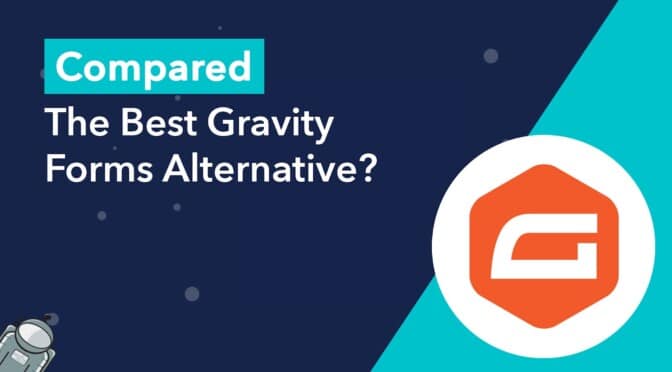With so many WordPress form builders out there, it’s difficult to know which is the best option for your website or app.
Gravity Forms is the first choice for many people as it’s easy to use and supports a wide range of powerful features. However, the form plugin you choose in the end will depend on your website and the features that you’re looking for.
Finding an effective Gravity Forms alternative is not easy. In fact, the question to ask is whether you need a Gravity Forms alternative at all?
In this post, we’re going to take an in-depth look at the Gravity Forms plugin and how it stacks up against other, popular WordPress form builders. Let’s get started!
Why Gravity Forms is the most powerful WordPress form plugin
Let’s take a closer look at why Gravity Forms occupies the top spot for “most powerful WordPress form plugin”.
Ease of use
The Gravity Forms plugin is built for ease of use. It features an intuitive, drag and drop, visual form editor that allows you to build complex forms without any knowledge of code.
The Gravity Forms editor has a similar feel to the WordPress block editor, making it familiar and easy to use for most WordPress users. The panel on the right contains the field settings and the conditional logic options open up in a fly-out panel, providing plenty of space to manage complex rules.
You can also drag and drop fields side-by-side, making it easy to create forms with multiple columns. Gravity Forms also includes a form template library, allowing you to create new forms with a single click.
Supported fields
One of the benefits of using Gravity Forms over other alternative plugins is that it supports a wide range of field types with different configuration options. This allows you to create customized forms for any use case.
Some advanced field types include:
- Address
- File Upload (supports multiple files and a wide range of document formats)
- List
- HTML
- Time
Gravity Forms also includes a range of pricing fields, which are helpful if you’re planning to create an eCommerce form and sell products through your website.
Flexibility
Unlike many Gravity Forms alternatives, Gravity Forms itself is a highly flexible and extensible WordPress form solution. You can use Gravity Forms to create simple contact forms, product order forms, event registration forms, member registration forms, and much more.
Enhancing Gravity Forms is also possible using add-ons – and there are plenty of them available!
In fact, Gravity Forms offers add-ons for:
- Accounting
- Analytics
- Anti-Spam
- Automation
- CRM
- eCommerce
- Feature Enhancements
- Messaging
- … And more!
This level of flexibility is difficult to find with other Gravity Forms alternatives.
Accessibility
If you’re not familiar with the concept of “web accessibility”, it’s the art of creating websites and apps that are easy to use and navigate and can be used by people with visual impairments or other disabilities.
When it comes to WordPress form builders, Gravity Forms is the leader in web accessibility. The plugin includes a range of features that help you craft forms that are easy to fill in for people with disabilities that might otherwise have a hard time. Accessibility is a feature that Gravity Forms emphasizes in its development, whereas other Gravity Forms alternatives may not.
Gravity Forms’ accessibility features include the following:
- A robust HTML5 structure
- Enhanced screen reader feedback for users with visual impairments
- The ability to provide feedback on form errors
- Easy keyboard navigation
- Warnings in the Admin about form accessibility issues
The CDC estimates that around 26% of US adults have some form of disability; that’s around 60 million people! Optimizing your web forms for accessibility can increase your user base, boost your organic traffic and improve the online experience for everyone.
Certified add-ons
Third-party, Gravity Forms Certified Developers also offer extensions that turn Gravity Forms into much more than a form plugin.
Displaying form submissions on the front end, exporting data to PDF, and performing advanced calculations on form entries are some of the things you can do using third-party extensions.
These add-ons allow Gravity Forms to be used as the foundation for membership websites, online stores, employee databases, and more.
Having a core group of Certified Developers that develop and maintain add-ons is something that other Gravity Forms alternatives simply don’t have!
Not just forms, but full-on applications
There are several Certified Developers that build and maintain add-ons for Gravity Forms. Many of these add-ons allow you to create powerful applications using your form data!
For example, the GravityView plugin by GravityKit allows you to display your form entries on the front end of your website. This enables you to build directories, front-end databases, client portals, volunteer management systems, and much more!
Gravity PDF is another Certified Developer that offers add-ons for exporting your form entries as custom PDF documents. This allows you to create invoices, certificates, and more.
A future-proof solution
Finally, perhaps the most compelling reason to use Gravity Forms is that it’s a plugin with amazing support that’s guaranteed to work: it’s future-proof.
The company behind Gravity Forms is Rocketgenius. They are a group of dedicated professionals who launched Gravity Forms more than a decade ago as one of the very first premium WordPress plugins!
Gravity Forms pricing structure
Gravity Forms has a straightforward, three-tiered pricing structure. Each license level gives you access to a range of add-ons as well as other desirable functionality. Here’s a brief overview of the different license levels:
- Basic ($59) – Includes standard support for 1 website and all Gravity Forms Basic add-ons.
- Pro ($159) – Includes standard support for 3 websites and all Gravity Forms Basic, and Pro add-ons.
- Elite ($259) – Includes priority support for unlimited websites and all Gravity Forms Basic, Pro and Elite add-ons.
Now let’s take a look at some examples of what you can do using the Gravity Forms plugin.
Examples of what you can do with Gravity Forms
Now that we’ve looked at some of the reasons for using Gravity Forms, let’s take a look at some examples of different types of forms and applications that you can build.
Contact forms
You may be looking for a form plugin in order to add a simple contact form to your site. Gravity Forms includes several features that make it ideal for this purpose. For example, Gravity Forms allows you to configure custom notification emails that send after a form has been submitted.
You can also add custom HTML content to the notifications and you can use Gravity Forms merge tags to add field values from the entry. The same goes for confirmation messages, which are shown to the user after they submit the form.
eCommerce forms
You can also use Gravity Forms as a basic eCommerce solution to sell products on your site!
All you need to do is create a form with one or more “Product” fields and install one of several payment add-ons (such as PayPal, 2Checkout, Stripe, or Mollie).
After that, users will be able to make payments on your site for digital products or services! You can also save time by downloading the eCommerce form template from the Gravity Forms template library.
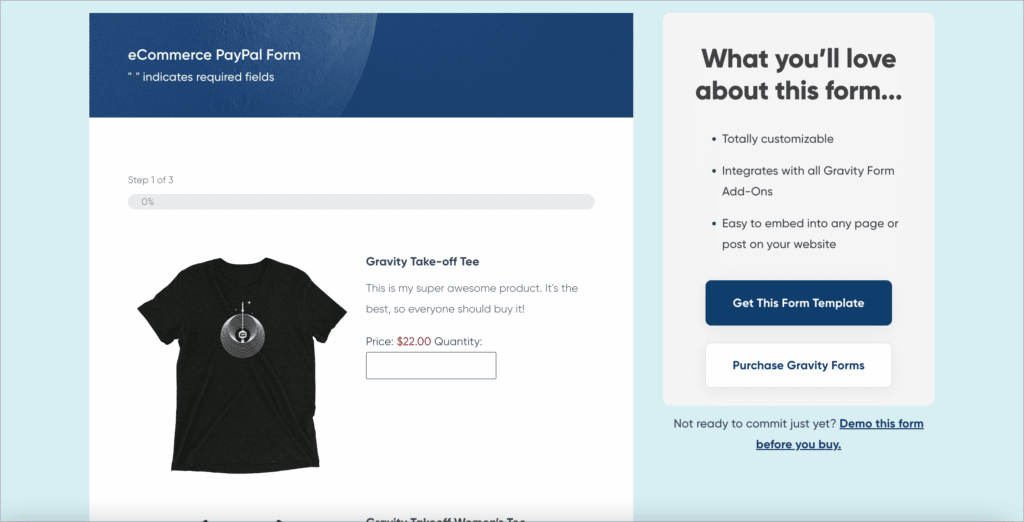
Email opt-ins
Are you looking to capture emails addresses and grow your email list? Gravity Forms is a powerful lead generation tool!
With Gravity Forms, you can build stylish opt-in forms to capture users’ email addresses and then send them to your email marketing system or CRM platform. In fact, Gravity Forms integrates with Aweber, Constant Contact, Email Octopus, HubSpot, and other marketing automation platforms.
Front end web applications
By installing GravityView, you can build sophisticated web applications on top of Gravity Forms! GravityView is a premium add-on that allows you to display your form data on the front end.
GravityView includes a range of layout templates allowing you to display your form data in different ways. This give you the flexibility to build all kinds of web apps, from simple directories to student information systems, and everything in between!
Dragonfly, a video production agency based in London, used GravityView to build an internal talent database for their network of freelance contractors.
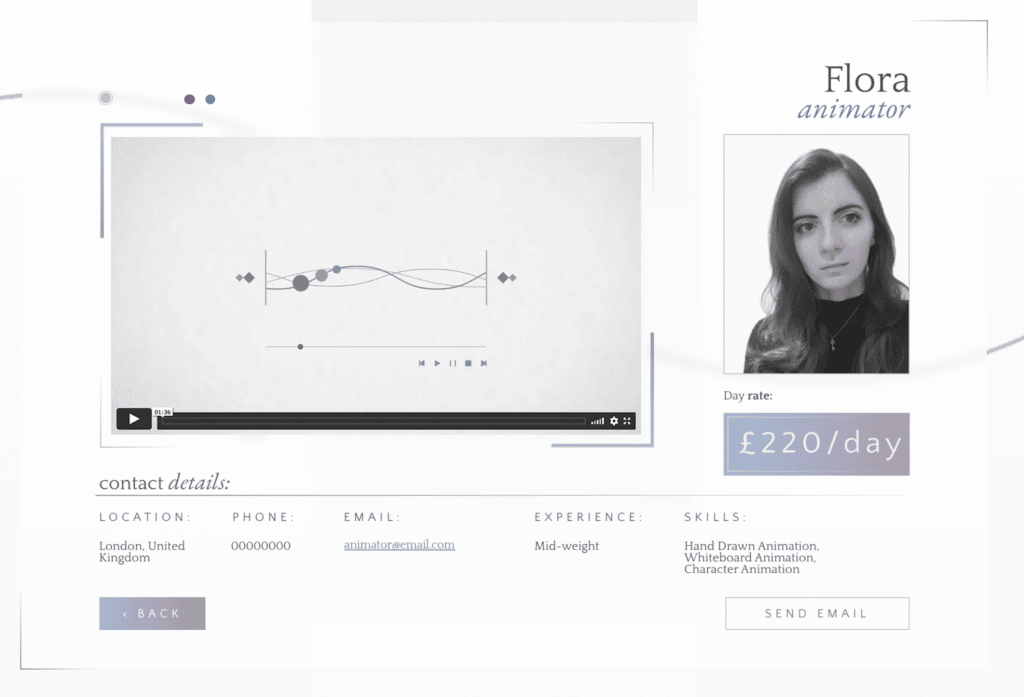
By using Gravity Forms and GravityView, Dragonfly were able to reduce development costs and improve business operations!
Nicolas Johansson at Pieroth (a wine producer and direct selling company) used Gravity Forms and GravityView to create a custom product information management system (PIM).
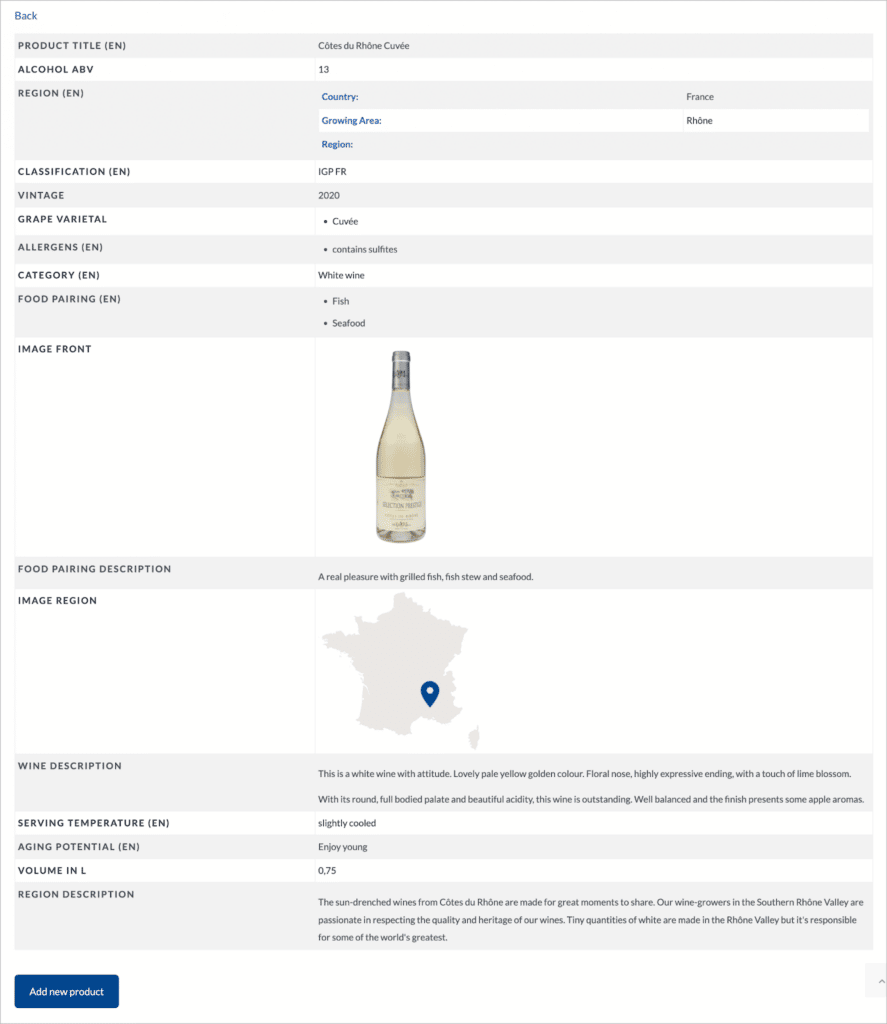
This PIM system allows Pieroth’s product managers to effectively manage their product portfolios across multiple countries! Pieroth found that GravityView provided them with an easy-to-use interface for product management at a much lower cost than most specialist PIM platforms.
Bet Hannon Business Websites, a full service WordPress agency, uses Gravity Forms and GravityView to build directories and member management systems for nonprofits in the US and abroad.
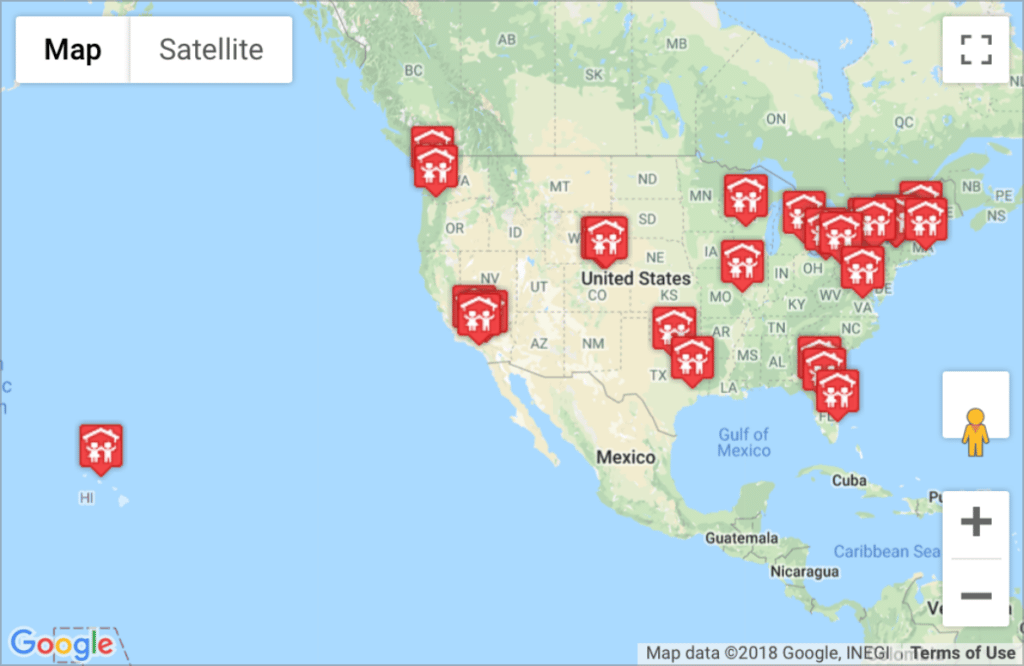
They often use the Google Maps integration to display locations on a Google Map. GravityView is the perfect solution for directories as it allows user to edit their profile from the front end. Building sophisticated applications like these is simply not possible with the majority of purported Gravity Forms alternatives.
💡 Pro tip: Do you want to see what else is possible with GravityView? Check out our blog for in-depth tutorials and guides, or sign-up for a free demo site!
Features to look for in a WordPress form plugin
When looking for a Gravity Forms alternative for your WordPress website, there are several things you should keep in mind. There may be consequences if you choose the wrong plugin. For example: it may introduce a security vulnerability leading to a hack, the developers may stop maintaining it, or you may find it’s too limited for your particular use-case.
Here are some factors to consider when selecting a WordPress form plugin.
Support
Any plugin you install on your website should include support from the author. After all, if you run into issues, you need someone who’s going to help you solve the problem. However, many free Gravity Forms alternatives don’t include direct support from the developer.
That’s why you should consider a premium plugin, as they offer support as part of the cost of the license. In fact, Gravity Forms is well-known for providing top-notch support to their customers! With an Elite license, your support requests will be moved into the “priority” queue, making for a speedier response.
Frequent updates
If you’re planning to install a Gravity Forms alternative, make sure you check when the plugin was last updated. It’s important that you only use plugins that are regularly updated, as this ensures compatibility with different WordPress versions.
Frequent updates are also a sign that the plugin is continually being patched for bugs and made more secure. It also means the developers are working to improve the plugin and add new features!
For example, if you look at the Gravity Forms change log, you can see that the plugin is updated multiple times a month with new fixes, features and improvements.
Extensibility
You may only need a simple contact form at first, but your requirements might change as time goes on. For example, you may eventually need to create more complex forms using conditional logic or integrate your forms with a payment gateway or marketing platform.
That’s why it’s important to choose a Gravity Forms alternative that is flexible and extensible to accommodate any future needs you may have.
This may come as a surprise to you, but no form plugin is more extensible than Gravity Forms itself! Gravity Forms has a robust feature list and there are well over 100 different add-ons allowing you to add additional functionality to the plugin.
Intuitive interface
When choosing a form plugin for your website, it’s beneficial to choose one that is easy to use with an intuitive interface. Having to construct forms using code is complicated, so rather choose a plugin that allows you to create forms using a drag and drop builder.
The Gravity Forms visual editor is a good example of a powerful and intuitive form builder interface. It’s also more intuitive than most other Gravity Forms alternatives.
A look at 6 possible Gravity Forms alternatives
Now let’s take a closer look at some purported Gravity Forms alternatives. Each of the form plugins below are popular among WordPress users. They each support different features and functionality, but how do they stack up against Gravity Forms? Let’s find out.
1. Type Form
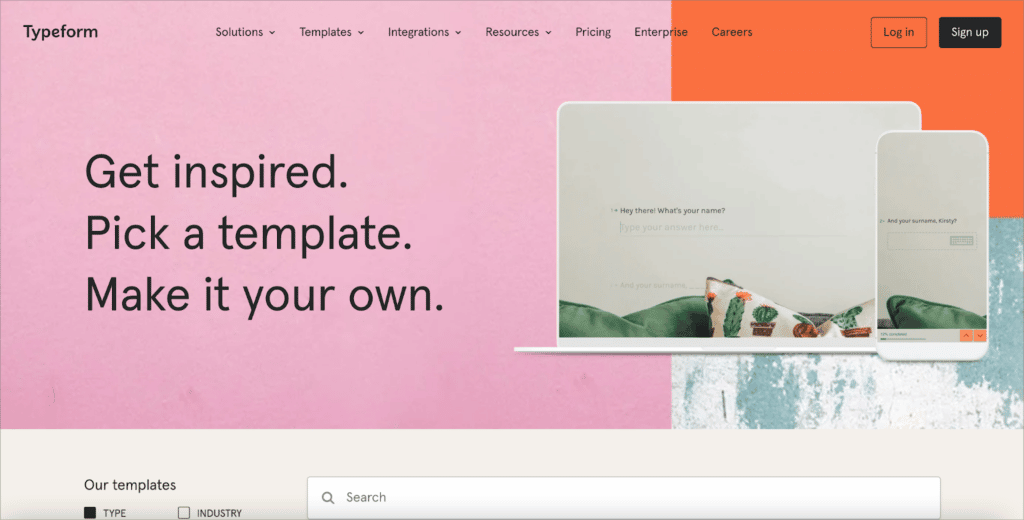
Typeform is an online form builder that allows people to “create forms, surveys, and quizzes that people enjoy answering”.
Type form is not technically a Gravity Forms alternative, because it’s not a WordPress plugin, it’s a SaaS platform! SaaS stands for “Software as a Service” – SaaS is a way to deliver applications over the internet without asking users to install any software.
You can use Typeform to create contact forms, request forms, application forms, surveys and more. Typeform includes a range of templates to help you get set up, and it features a visual builder allowing you to customize things to your liking.
Because Typeform is a SaaS tool, you can’t install it on your own website like you can with regular WordPress plugins. Instead, all your forms and data reside on Typeform’s servers. It’s for this reason that Gravity Forms is the superior choice for WordPress websites.
2. Ninja Forms
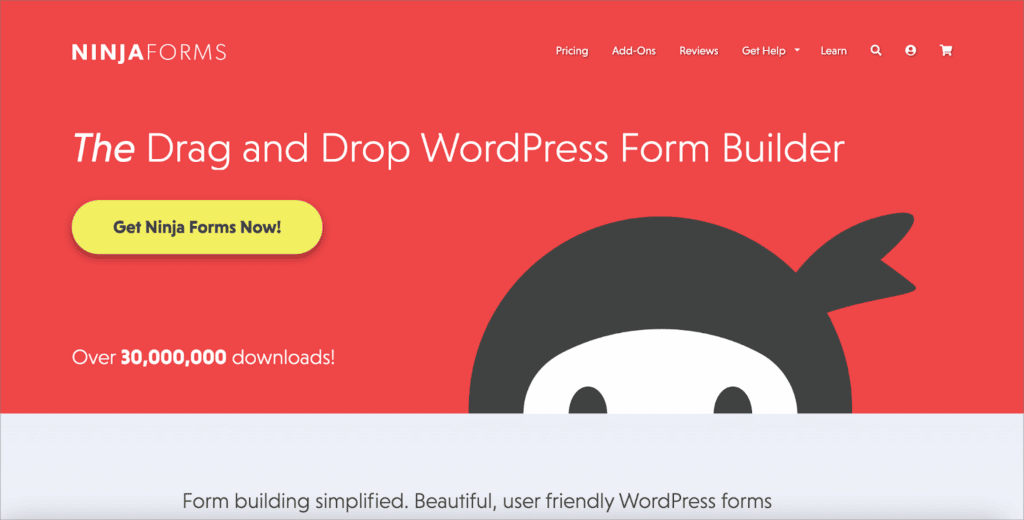
Ninja Forms is a well-known and popular form builder for WordPress. The plugin includes a wide range of field types and an intuitive visual builder. However, if you’re planning to use Ninja Forms as a Gravity Forms alternative, you may find it too limited when it comes to form design and integrations.
In fact, Ninja Forms fails to deliver in the following key areas:
- Unlike Gravity Forms, Ninja Forms lacks advanced spam protection.
- The Gravity Forms Survey and Poll fields include more options
- It’s not easy to change the layout of form fields
- Various basic features included in Gravity Forms require an add-on to work in Ninja Forms
3. Formidable Forms
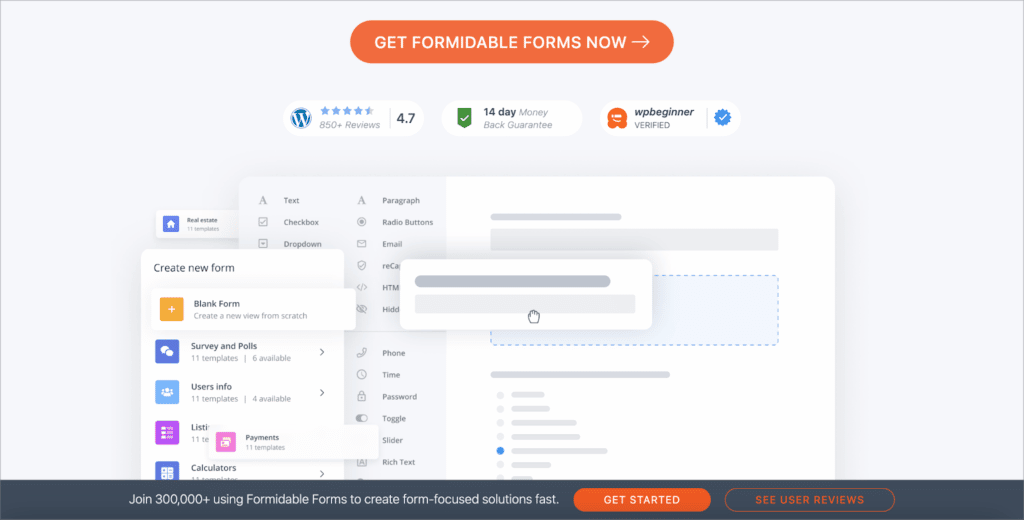
When choosing a Gravity Forms alternative, it’s important to choose one that’s reliable, flexible, and well-supported.
Formidable Forms is a powerful form plugin that offers many of the same features as Gravity Forms. However, when it comes to ease of use, the Gravity Forms visual builder outperforms the Formidable Forms equivalent.
Furthermore, Formidable Forms does not support all the accessibility features that Gravity Forms does.
4. WP Forms—is it the Best Free Gravity Forms Alternative?
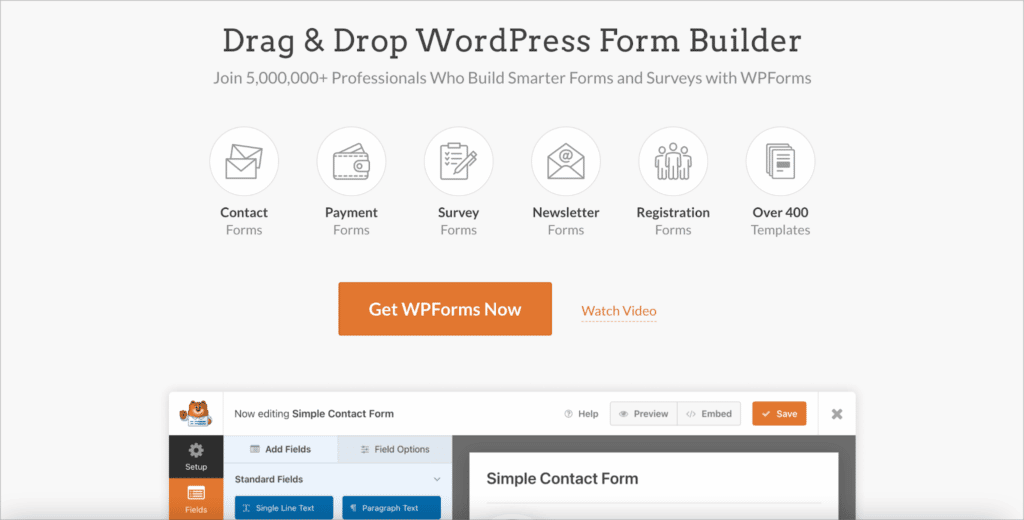
WP Forms is one of the most popular form plugins for WordPress and is often promoted as a Gravity Forms alternative. With WP Forms, you can build custom web forms using a drag and drop interface. This includes basic contact forms, surveys, payment forms, and more.
WP Forms also has a free version, making it a popular choice for anyone with a tight budget. Although it’s a powerful plugin, WP Forms is not the complete solution that Gravity Forms offers.
For example, Gravity Forms supports a greater number of add-ons and integrations than WP Forms. There is also no way to display your WP Forms data on the front end, whereas you can do this using Gravity Forms and GravityKit.
5. Contact Form 7—can it be considered a Gravity Forms alternative?
Contact Form 7 is a simple, free and effective form plugin for WordPress. It’s one of the most popular WordPress plugins and one of the longest standing contact form plugins for WordPress.
If you want to add a simple contact form to your site, Contact Form 7 works well. However, beyond this simple use case, it is very limited. For example, if you need more features and functionality, you’re better off using Gravity Forms!
Contact Form 7 does well at providing a simple contact form solution, but it can’t be compared to Gravity Forms, and therefore, it is not a viable Gravity Forms alternative. In Fact, Contact Form 7 does not include a visual builder, requiring simple coding knowledge to get set up.
With a drag and drop builder, robust accessibility features, and a wealth of powerful add-ons, Gravity Forms is the ideal choice for anyone looking to collect and manage important data on their WordPress website.
6. Fluent Forms – is it the ultimate Gravity Forms alternative?
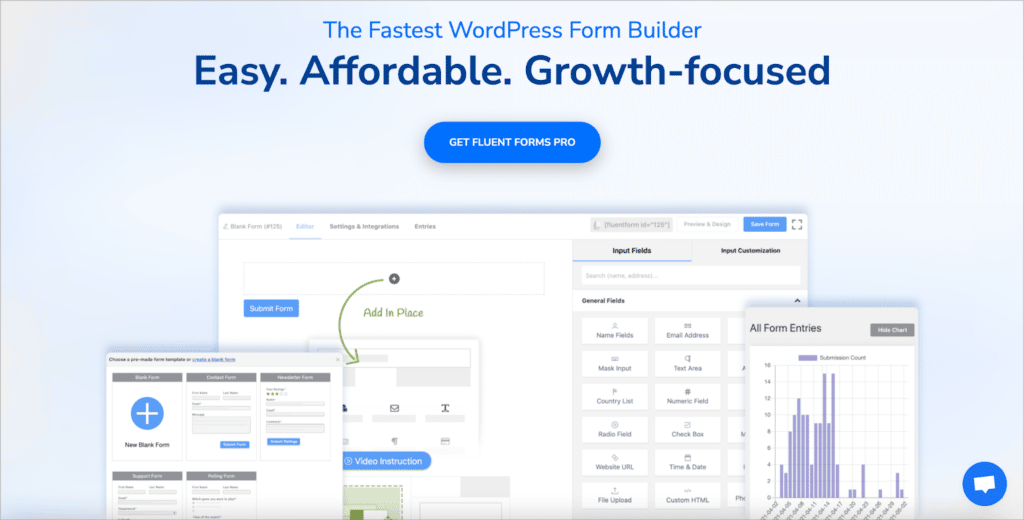
Fluent Forms is a powerful form builder for WordPress and a popular alternative to Gravity Forms. In fact, both plugins offer a wide selection of input fields, including File Uploads, Drop Downs, and other advanced field types.
Additionally, both plugins allow you to create sophisticated notifications and confirmation messages. Gravity Forms and Fluent Forms also make it equally easy to manage form entries from inside the Admin panel, allowing you to edit, delete, or export entries to CSV.
Having said all of this, Gravity Forms offer a better form building experience. The Gravity Forms drag-and-drop builder has an intuitive “block-like” feel, matching that of WordPress Gutenberg, while the Fluent Forms equivalent is a little more confusing for new users.
So is Fluent Forms a viable Gravity Forms alternative? It can be. But it depends on what you’re trying to accomplish, as Gravity Forms supports more features and integrations.
Final thoughts on the 6 best Gravity Forms alternatives
Gravity Forms has been a mainstay in the WordPress ecosystem for more than a decade. It was one of the first premium WordPress plugins and is the most trusted form builder.
If you’re looking for a Gravity Forms alternative, you may be surprised to learn that most other form plugins don’t support the same advanced features and add-ons that Gravity Forms does. Here’s why Gravity Forms is still the best choice:
- Easy and intuitive to use (even for new users)
- Wide variety of supported field types
- Makes it easy to create accessible forms for people with disabilities
- It’s a flexible tool for creating workflows and applications
- Includes a wealth of add-ons and integrations
In this post, we took an in-depth look at Gravity Forms and why it’s the most powerful form plugin for WordPress. We also reviewed some possible Gravity Forms alternatives for those looking to use different form builders on their website.
If you found this post helpful, subscribe to our newsletter below, so we can notify you when we publish new content! 👇

Helpful tips right in your inbox.
Subscribe to our weekly newsletter for tips, special offers, and more!
Helpful tips right in your inbox.
Subscribe to our weekly newsletter for tips, special offers, and more!
